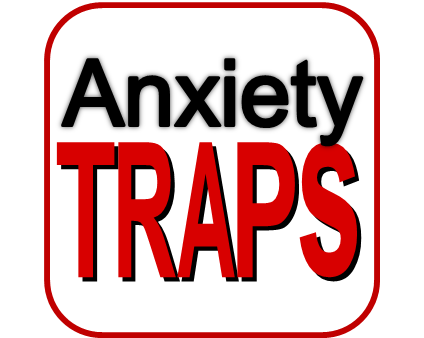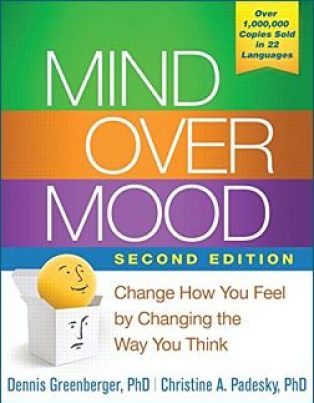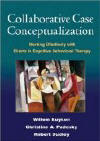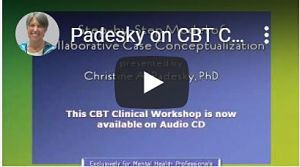Examples of Previous Workshops
- Anxiety Traps! CBT Antidotes
- Building Resilience
- CBT Boot Camp 2.0: Building Core Therapist & Client Skills Using MOM2
- Collaborative Case Conceptualization: Incorporate Strengths to Build Resilience
- Best Practices: CBT for Depression & Suicide
- Simplifying CBT for Personality Disorders: A NEW Paradigm
- CBT Boot Camp: Building Core Clinical Competencies
Example of Anxiety Traps! CBT Antidotes

ATTENDEE TWITTER COMMENTS
- Absolutely loved the anxiety traps workshop in London! Already putting things you taught into practise with clients!
- Anxiety Traps. Yet another great workshop & inspirational teaching.
Anxiety Traps! CBT Antidotes
Workshop Duration: 2 days / 12 hours
Anxiety Traps! is aimed at novice to intermediate therapists familiar with anxiety treatments and yet often uncertain their therapy is on the best track. Clients often feel trapped in anxiety. This is because common anxiety coping strategies such as avoidance and safety behaviors unwittingly maintain anxiety disorders. Unfortunately, it is also the case that some common therapy practice designed to relieve client distress instead trap therapists and clients in ineffective cycles of therapy.
This two-day workshop from leading cognitive behavioral therapy (CBT) instructor Christine A. Padesky, Ph.D. teaches principles and methods that help therapists and clients avoid both types of anxiety traps. Participants learn to identify and target central beliefs and behaviours that maintain anxiety. Learn Padesky’s organizing framework for understanding anxiety disorders and designing effective treatment plans. Practice CBT interventions most helpful for each type of anxiety disorder. Also learn when they are likely to be effective or likely to prolong anxiety treatment. Participants have an opportunity to bring their learning to life in carefully designed experiential exercises, framed by clear didactic teaching, organized handouts, and rich clinical discussions.
WORKSHOP OBJECTIVES
- LINK the anxiety equation to specific anxiety disorders
- PRACTICE induction methods used in treatment of panic & OCD
- DEBRIEF behavioural experiments to maximize client learning
- TEACH clients to address “what if?” worries with action planning
- CONDUCT role play practice of “assertive defense of the self”
- OBSERVE approaches that address post-traumatic memory gaps
Example of Building Resilience

DISCLAIMER: No actual lemons will be injured in the course of this workshop!
ATTENDEE TWITTER COMMENTS
- We use your model of resilence in our Advanced CBT group on our Eating Disorder unit.
- A whole day yesterday spent working on models of resilience, strengths focused CBT, acceptance and mindfulness with nurse students.
Building Resilience
Workshop Duration: 2 days / 12 hours OR 1 day / 6 hours
The following is an example of a 3 hour workshop on building resilience titled: When Life Gives You Lemons . . . Use Strengths-Based CBT’s Four-Step Model to Build Resilience. Requires a Basic level of familiarity with the material.
PRESENTERS
Christine A. Padesky, PhD & Kathleen A. Mooney, PhD
Center for Cognitive Therapy, Huntington Beach, California
DESCRIPTION
“When life gives you lemons, make lemonade.” You’ve probably heard this phrase so many times that it seems trite, but proverbs like this one point out the importance of being resilient in the face of life’s challenges. Therapists know giving advice does not change behavior. So how can a therapist help clients become more resilient in the face of adversity?
This workshop teaches a 4-step model that helps clients build a Personal Model of Resilience (PMR). It is a model that is easily integrated with classic CBT approaches and other evidence-based therapies.
Drawing on the principles of strengths-based CBT, five key methods are highlighted:
- How to identify and integrate strengths into CBT
- When and how to introduce resilience
- The timing and rationale for therapeutic smiling
- Use of imagery and metaphor
- The importance of silence for fostering client creativity
This workshop is loaded with clinical demonstrations, structured participant role-plays, and question-and-answer segments that clarify the theory, rationale, methods, and application of a PMR. Common therapy pitfalls are identified along with recommended alternative approaches.
YOU WILL LEARN TO:
- IDENTIFY areas of strengths that relate to resilience
- PRACTICE Socratic methods to elicit client-generated imagery and metaphors of resilience
- BUILD & APPLY a personal model of resilience (PMR) to create win-win responses to acute and chronic life challenges
ACTION ITEM PRE-WORKSHOP
Participants are strongly encouraged to download and read Padesky and Mooney’s 2012 paper before attending the workshop. Greater familiarity with this material will foster increased depth of workshop learning (i.e., the more you know, the more you will learn).
RECOMMENDED READINGS
Mooney, K.A., & Padesky, C.A. (2000). Applying client creativity to recurrent problems: Constructing possibilities and tolerating doubt. Journal of Cognitive Psychotherapy, 14(2), 149-161. Available from https://padesky.com/clinical-corner/publications (in the Creativity section)
Padesky, C. A., & Mooney, K.A. (2012). Strengths-based Cognitive-Behavioural Therapy: A four-step model to build resilience. Clinical Psychology & Psychotherapy, 19 (4), 283-90. Available from https://padesky.com/clinical-corner/publications (in the Strengths-Based CBT section)
Example of CBT Boot Camp 2.0
Building Core Therapist & Client Skills Using MOM2

ATTENDEE TWITTER COMMENTS
- You had the Big Picture in mind
- Very interactive
- Repeated participant questions so we all could hear clearly
- Used projector to write examples
- Impressed with the number of times you checked with your client: to get their permission, to check their understanding and to check alignment
CBT Boot Camp 2.0: Building Core Therapist & Client Skills Using MOM2
Workshop Duration: 2 days / 12 hours
Workshop Description: CBT Boot Camp 2.0 features innovative participant exercises that approach familiar topics in novel ways. Although there is thematic overlap with the first CBT Boot Camp workshop, the majority of the clinical demonstrations, exercises, and content of this workshop are different. Workshop learning is enhanced through many live clinical demonstrations, structured participant exercises, and handouts. As always, this workshop is infused with Dr. Padesky’s signature warmth, humour, and an emphasis on practical clinical tips.
Participants in this workshop will learn directly from Dr. Padesky about how to link the new version of Mind Over Mood with evidence based treatment protocols.
In addition, participants learn how to use MOM2 (Mind Over Mood, 2nd Ed., Greenberger & Padesky, 2016) in therapy to work more effectively with depression, anxiety disorders, anger, guilt, and shame. Previous familiarity with this workbook is not required. Participants learn how MOM2 can boost therapist skillful practice at the same time it boosts client skill development.
Differences from the first edition of this best-selling workbook include:
- expanded sections on anxiety management including fear ladders, safety behaviours, imagery, mindfulness and acceptance methods
- integration of evidence based methods drawn from positive psychology such as gratitude diaries and happiness ratings
- new chapters on goal setting, relapse management
- an expanded chapter on using behavioural experiments to test assumptions
ATTEND CBT BOOT CAMP 2.0 AND ACHIEVE GREATER CBT FITNESS
By the end of Boot Camp, participants will achieve greater CBT fitness in the areas of:
- therapy structure and alliance
- improving client ability to observe and self-monitor
- assigning and debriefing relevant homework relevant to specific client moods
- use of guided discovery methods (such as Socratic dialogue, thought records, and behavioural experiments)
Achieve greater CBT fitness in a wide variety of areas including structure, alliance, behavioral experiments.
WHAT IS MOM2? DO I NEED A COPY FOR THIS WORKSHOP?
The first edition of Mind Over Mood (1995) was published over 20 years ago, and since then has sold more than 1 million copies in 23 languages. The fully revised and updated 2nd Edition (2016), referred to as MOM2. It is best to have a copy of MOM2 with you as it will be referenced extensively during the workshop.
LEARNING OBJECTIVES
- PRACTICE a 5-part model for collaborative case conceptualization
- IDENTIFY SKILLS empirically linked to improvement in depression and anxiety
- LINK MOM2 chapter reading order with treatment protocols
- IDENTIFY and TEST mood-related images
- ASSIST clients in following a 3-step plan for relapse management
- CONSIDER when forgiveness is therapeutic and when it is not
- FOLLOW research guidelines for gratitude diaries, mindfulness practice, and other evidence-based intervention methods
Learn how to use MOM2 in therapy to work more effectively with depression, anxiety disorders, anger, guilt, and shame.
WHO SHOULD ATTEND
Especially designed for novice and intermediate level CBT therapists who want to build and strengthen their own core clinical skills as well as understand more clearly how therapist skills parallel skills that we want to teach clients.
Join Us and learn directly from Dr. Padesky about how to link the new version of her self-help workbook with evidence based treatment protocols.
Example of Collaborative Case Conceptualization:
Incorporate Strengths to Build Resilience
Collaborative Case Conceptualization: Incorporate Strengths to Build Resilience
Workshop Duration: 1 day / 6 hours
A new approach to CBT case conceptualization (Kuyken, Padesky, & Dudley, 2009) offers a step-by-step model to guide therapists’ treatment planning with complex cases, especially when no single treatment model applies. This approach incorporates three guiding principles:
- Collaborative empiricism
- Three levels of conceptualization that evolve over the course of therapy
- Incorporation of client strengths into each level of conceptualization so therapy is designed to both relieve distress and build resilience
While this workshop demonstrates all three principles, there is an emphasis on incorporation of client strengths at each stage of conceptualization. Padesky models how to incorporate client culture, personal interests, imagery, and metaphors into constructive, strengths-based conceptual models. In addition to the opportunity to participate in structured exercises designed to develop relevant skills, participants explore the implications of explicitly adding a strengths and resilience focus to CBT conceptualization and treatment. This multimedia program enhances learning via live and video clinical demonstrations, structured role plays, small group exercises, and comprehensive handouts.
Dr. Padesky is internationally renowned for her ability to convey complex clinical processes with simplicity, depth and humanity. In addition, audiences appreciate her clinical excellence, warmth, clarity and humor. Don’t miss out! Learn this innovative approach that Aaron T. Beck calls “a gold standard for how to develop individualized case conceptualizations with our clients.”
Learning Objectives
- DIFFERENTIATE between three levels of case conceptualization
- IMPROVE your awareness of how to search for “hidden” client strengths
- PRACTICE methods to bring strengths into client awareness
- COLLABORATE with your clients to construct conceptualizations that incorporate strengths as well as vulnerabilities
- EXPLORE the added value of identifying client-generated metaphors and imagery
Recommended Readings
Kuyken, W., Padesky, C. A., & Dudley, R. (2009). Collaborative case conceptualization: Working effectively with clients in cognitive-behavioral therapy. New York: Guilford. (read the FIRST CHAPTER online)
Mooney, K.A., & Padesky, C.A. (2000). Applying client creativity to recurrent problems: Constructing possibilities and tolerating doubt. Journal of Cognitive Psychotherapy: An International Quarterly, 14 (2), 149-161. [article available online – see creativity section]
Example of Best Practices: CBT for Depression & Suicide

ATTENDEE TWITTER COMMENTS
- Looking at developing group based CBT treatment for depression after your London lecture. Was so helpful thank you.
- Thank you for an inspiring and fun workshop on depression in London. Looking forward to putting it into practice.
- What an amazing workshop on CBT for depression and suicide in London this week. Inspiring.
- Very informative, and ready to face new challenges in suicide and depression.
- Excellent 2 day CBT for depression and suicide workshop in Wexford with the talented @Padesky #thanksforthephoto
Best Practices: CBT for Depression & Suicide
- Reveals a wealth of “Best Practices in CBT for Depression and Suicide”
- Shows therapists how to meet the challenges in the treatment of depression in both individual and group therapy
- Emphasizes clinical methods with a strong evidence-base for effectiveness
- Illustrates how depressed and suicidal clients benefit when these interventions build on existing strengths
- Teaches a structured interview method to guide suicide assessment
- Illustrates evidence-based interventions that can lower suicide risk, reduce suicide attempts and increase client safety
- efficiently use therapist time and efforts
- focus on specific symptoms / create “smarter” therapy
- space sessions to reduce the discontinuation effect”
- strategically use self-help materials, groups, and individual therapy
- structure CBT groups to maximize participation, skill development and reduce relapse risk
- USE client symptom measures to guide treatment & decision-making
- EMPLOY 3 behavioural experiments to increase anti-depressant client activity
- TEST negative automatic thoughts in action as well as on paper
- DESIGN therapy groups to enhance positive outcomes
- ASSESS suicide risk
- INDIVIDUALIZE suicide intervention plans
- MAKE evidenced-based decisions about when to stop or continue therapy
- DESIGN therapy groups to reduce relapse risk
Example of Simplifying CBT for Personality Disorders:
A NEW Paradigm

ATTENDEE TWITTER COMMENTS
- New paradigm for PD workshop very inspiring.
Simplifying CBT for Personality Disorders: A NEW Paradigm
Workshop Duration: 2 days / 16 hours See Padesky’s brief description on YouTube
This workshop is designed to enhance your understanding and skills
Too often theories and therapy approaches make treatment of personality disorders seem so complicated that therapists and clients become discouraged and frustrated. Over the last 20 years, Christine A. Padesky, Ph.D. and her colleague, Kathleen A. Mooney, Ph.D. have developed the NEW Paradigm for Cognitive Behavioral Therapy (CBT) of personality disorders. The NEW Paradigm for CBT is a 4-stage model that is simple to understand and can be easily learned by therapists already familiar with CBT approaches for Axis I disorders such as depression, anxiety, eating disorders, and other common presenting issues.
The NEW Paradigm incorporates many of Padesky’s signature therapy approaches:
- collaboration
- guided discovery
- integration of client strengths
- methods for building client resilience
In addition, it places increased emphasis on
- client imagery
- use of client-generated metaphors
- kinesthetic awareness
- and a step-by-step therapy framework that is designed to help clients embrace change
Methods taught target construction of NEW belief systems and interpersonal behavior patterns, rather than focusing on dysfunctional beliefs and behaviors. Behavioral experiments are used to build resilience in use of the NEW system. Concrete steps are outlined and demonstrated using client examples. Participants practice applying skills in common clinical situations via structured role-plays. Learning is enriched through clinical demonstrations, structured participant exercises, didactic presentations, written handouts, and analyses of interpersonal clinical processes.
Attendees Will Learn To
- Simplify personality disorder treatment
- Work with impasses such as avoidance, rigidity or angry attacks
- Address your own reactions e.g., irritation with a particular client
- Increase client’s readiness to change
- Conceptualize the OLD overdeveloped interpersonal strategies
- Construct NEW belief systems and interpersonal behavior patterns
- Use imagery, metaphors and kinesthetics
- Strengthen the NEW system through behavioral experiments, core belief logs and continuums
- Set-up relapse prevention: predict challenges and develop active plans to manage them
Objectives
- PRACTICE NEW language in role play interviews
- IDENTIFY therapist beliefs that provide boosts or barriers to personality disorder treatment
- EMPLOY a structured interview to help clients compassionately conceptualize their OLD personality system
- GUIDE client construction of a NEW personality system via a structured interview
- IDENTIFY client imagery and kinesthetic anchors for the NEW system
- INCREASE awareness of the impact of nonverbal therapist communications on clients
- DESIGN behavioral experiments to test predictions based on OLD and NEW systems
- DEBRIEF behavioral experiments through a NEW lens
Example of CBT Boot Camp:
Building Core Clinical Competencies

ATTENDEE TWITTER COMMENTS
- The Christine Padesky workshop in Liverpool was, without a doubt, the best workshop I’ve done. Thanks
CBT Boot Camp: Building Core Clinical Competencies
Featuring core compentencies and fundamental skills in CBT
Workshop Duration: 2 days / 12 hours
Boot Camp is especially designed for therapists who want to build and strengthen core CBT clinical competencies as well as understand more clearly how these competencies function as the foundation for all CBT protocols.
By the end of Boot Camp, participants will achieve greater CBT fitness in the areas of:
- therapy structure and alliance
- client observation and self-monitoring
- awareness of safety behaviors versus good coping
- assigning and debriefing relevant homework
- and use of guided discovery methods (such as Socratic dialogue, thought records, and behavioral experiments).
Dr. Padesky also demonstrates therapeutic responses to common therapy obstacles that often derail CBT progress. Following her demonstrations, participants engage in “obstacle courses” which are exercises designed to help therapists apply the appropriate core competency in the face of these challenges.


